In this article:
Many people experience hair fall at one point in their life. Common causes include the shampoo they use, dietary habits, hair styling practices, and hair care routine.
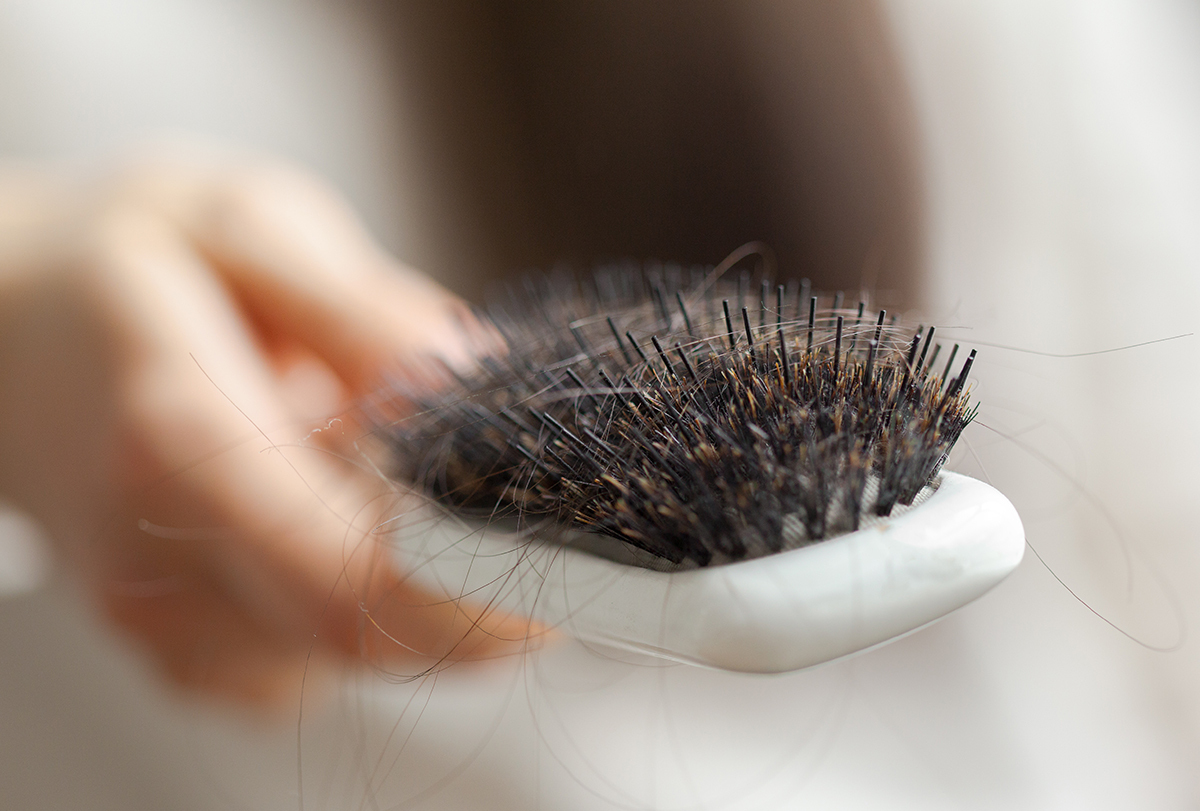
Another culprit is an oily scalp. Yes, it is true that scalp health can make a huge impact on your hair. Therefore, it’s important to take care of it.
Continue reading to learn how you can control hair fall when you have an oily scalp.
Relationship Between an Oily Scalp and Hair Fall
Your scalp contains sebaceous glands, which are glands that produce oil and wax. They produce what is known as sebum.
Sebaceous glands provide the required moisture and lubrication to your skin and hair. There are channels originating from these glands that lead to individual hair follicles.
However, when your glands produce too much oil, your scalp can become excessively greasy. Although harmless, this excessive oil can obstruct the pores on the scalp, negatively affecting your normal hair growth. You may eventually experience hair thinning and rapid hair loss. (1)
The sebum produced by the sebaceous glands differs from person to person and depends upon various factors such as:
- Age
- Gender
- Hormonal imbalances
- Diet
An increase in sebum production in the scalp can lead to itchiness, discomfort, and dandruff problems. The condition can worsen and, due to bacterial and fungal growth, can further develop into infections. (1)
Controlling Hair Fall With an Oily Scalp
When you have an oily scalp, follow these measures to prevent and stop hair fall.
1. Consume foods that block DHT
DHT stands for dihydrotestosterone, which is a hormone similar to testosterone. DHT activates the sebaceous glands to produce excessive amounts of sebum, leading to an oily scalp. Thus, DHT contributes to hair loss, and it affects both men and women.
An increased level of DHT affects your hair follicles and can lead to male–pattern baldness and thinning of hair.
DHT is formed from testosterone by the enzyme called 5-alpha reductase. Eating foods that contain compounds that block this enzyme and thereby decrease DHT production from testosterone can prevent hair loss. (2)(3)
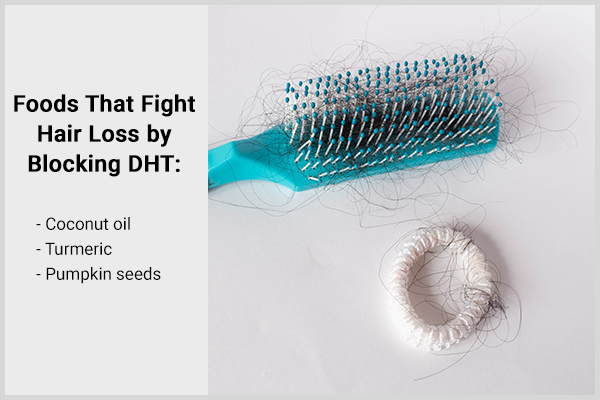
Some foods that can help fight hair loss by blocking DHT are:
a. Coconut oil
Coconut oil contains an elevated amount of fat from medium-chain triglycerides including lauric acid.
Studies have demonstrated that these triglycerides block DHT production in animal models when taken orally. So, including coconut oil in your diet may be helpful to fight hair loss from an oily scalp. (4)(5)(6)
b. Turmeric
Turmeric is a popular herb that is commonly used in cooking in powder form and offers a ton of health benefits. These health outcomes of turmeric are related to its high concentration of active components called curcuminoids, which include curcumin.
Studies on animal models have ascertained that curcumin lowers levels of DHT by obstructing the activity of alpha-5 reductase, although more human studies are required to confirm these effects. (7)(8)
c. Pumpkin seeds
Pumpkin is an enjoyable food in itself and everyone’s favorite fall veggie, but it also contains nutritious seeds that are rich in important nutrients including:
- Iron
- Zinc
- Magnesium
- Antioxidants
Most importantly, pumpkin seed oil can hinder DHT conversion from testosterone by barring the action of alpha-5 reductase.
In one study, pumpkin oil supplement was able to promote hair growth when given daily in men. However, more research in humans is essential to establish its use in hair loss prevention. (9)
2. Eat foods rich in quercetin
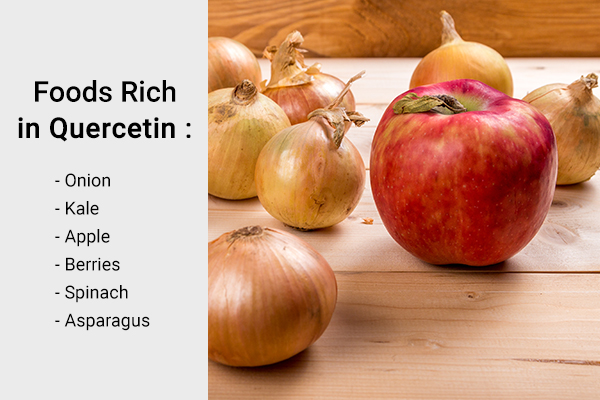
Antioxidants such as quercetin have been studied and found to decrease oxidative stress that causes hair loss, and they also hamper the production of DHT hormone from testosterone by obstructing the activity of the enzyme called alpha-5 reductase.
Therefore, eating foods abundant in quercetin may help prevent hair loss in those who have an oily scalp due to an overproduction of sebum triggered by the DHT hormone. (10)
These food include: (11)
- Onions
- Kale
- Apple
- Berries
- Spinach
- Asparagus
3. Manage stress
Stress is every human’s worst enemy. It causes hormonal imbalances and leads to an array of health issues.
Studies have shown that an elevation in stress levels can cause an increase in testosterone production. This would mean an increased conversion of testosterone to DHT, which can lead to an oily scalp by promoting sebum production.
Anecdotal evidence also suggests that stress causes increased hair loss from other mechanisms as well.
So, managing stress is vital to having healthy hair. If you experience constant stress, learn to manage it and try some relaxation activities. Stress-busting activities include journaling, exercising, yoga, meditation, and walking.
In severe cases, it is highly recommended to seek professional help such as therapy. (12)(13)
4. Control skin conditions
Various dermatological ailments such as psoriasis and seborrheic dermatitis of the scalp lead to a buildup of dead cells and increased oil production by the sebaceous glands. (14)
Using medicated shampoos and conditioners or home remedies such as aloe vera gel for the management of such issues is a good way to deal with hair loss from an oily scalp. (15)
5. Observe good hair wash practices
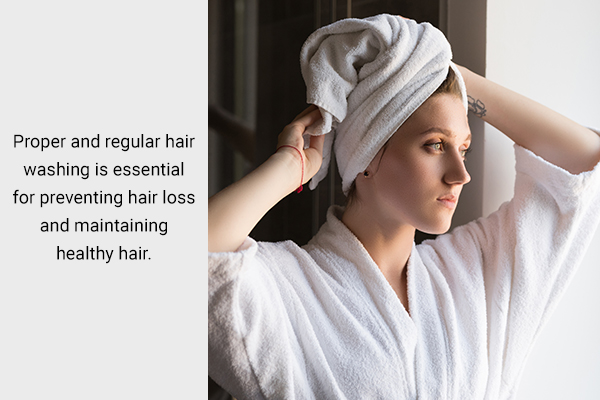
Keeping up with good personal hygiene is vital to promoting healthy hair, particularly for those experiencing hair loss due to an oily scalp.
To avoid disrupting hair growth, it’s important to detangle your hair before shampooing and pay attention to lathering your scalp rather than just your hair to eliminate debris and buildup. As you wash the shampoo off your scalp and hair, the hair fibers get adequately cleaned.
Moreover, it’s crucial to adjust the frequency of shampooing based on how oily your scalp is, with extremely oily scalps requiring daily shampooing.
In summary, proper and regular hair washing is essential for preventing hair loss and maintaining healthy hair. (16)
6. Use the right products; skip conditioners
When it comes to oily hair, choosing the right hair care products is important to maintain its health. Shampoos that are specifically designed for oily hair are formulated to remove excess oil from the scalp and hair shaft. This is achieved by using strong detergents and minimal conditioning agents.
The primary detergents used in these shampoos are lauryl sulfates or sulfosuccinates, which are very effective at removing sebum from oily hair.
In particular, sulfosuccinates are a type of strong detergent that is commonly used in shampoos for oily hair. Examples of sulfosuccinates include disodium oleamine sulfosuccinate and sodium dioctyl sulfosuccinate.
Since oily hair naturally produces enough sebum, the use of conditioners is not necessary. However, selecting the right shampoo with strong detergents can help boost the health of oily hair. (17)
Additional tips
Experts suggest some other practices to promote healthy hair. These include:
- Drink plenty of water.
- Follow a healthy diet.
- Reduce daily stress.
- Try shampooing every other day.
- Clean your hairbrushes and comb every now and then.
- Use gentle sulfate-free hair care products.
At-Home DIY Hair Masks for Oily Hair
Oily hair can be challenging to manage. Fortunately, several DIY hair masks can help keep your hair healthy.
Here are a few hair mask recipes that you can try at home, as suggested by some experts and hair care professionals.
1. Green tea hair mask
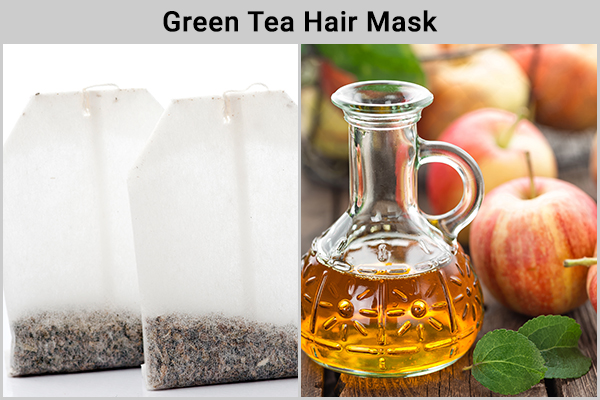
In one study, male volunteers who applied a 3% green tea emulsion to their faces twice daily for 8 weeks witnessed significantly reduced skin sebum production compared to a control group. Sebum production is a key factor in the development of oily skin.
While the study did not directly examine the effects of green tea on hair, it suggested that green tea may have similar benefits for controlling oil production on the scalp. This could potentially help to reduce scalp oiliness and improve the overall health and appearance of the hair. (18)
To make and use a green tea hair mask:
- Brew 2 green tea bags and let the tea cool down.
- Mix ¼ cup of apple cider vinegar with the cooled-down green tea.
- Apply the mixture to your scalp and hair, and leave it on for about 30 minutes.
- Rinse your hair thoroughly with cool water and shampoo as usual.
Apple cider vinegar helps balance the pH of the scalp, while green tea helps reduce inflammation and sebum production.
2. Lemon juice hair mask
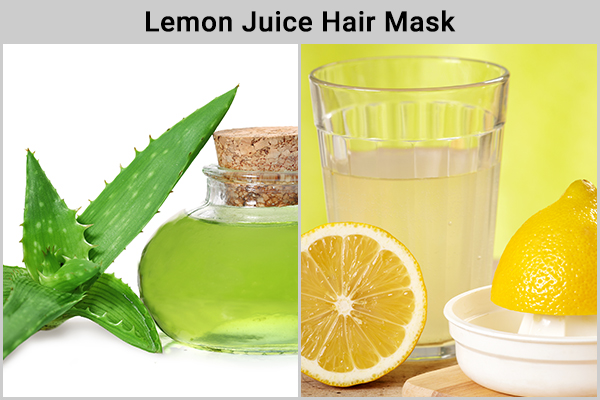
Researchers found that nobiletin, a flavonoid found in citrus fruits, inhibited sebum production and sebocyte (sebum-producing cells) proliferation, which are both key factors in the development of oily skin.
In addition, nobiletin increases sebum excretion, which is important for removing excess oil from the skin.
These findings suggest that nobiletin and other citrus flavonoids may have the potential as natural remedies for controlling oily skin. (19)
To make and use a lemon juice hair mask:
- Mix 2 tablespoons of aloe vera gel with 2 tablespoons of lemon juice.
- Apply the mixture to your scalp and hair, and leave it on for about 20 minutes.
- Rinse your hair thoroughly with cool water and shampoo as usual.
The citric acid in lemon juice helps regulate oil production, while aloe vera nourishes and soothes the scalp. These DIY hair masks can be used once a week or as needed, depending on your hair type and the oiliness of your hair and scalp.
How to Clean Your Hairbrushes and Combs Correctly
Cleaning your hairbrushes and combs is important to keep them free from the buildup of dirt, oils, and hair products.
To clean your hairbrushes and combs correctly:
- Remove hair from the brush or comb by using another comb or your fingers.
- Fill a bowl or sink with warm water and add a small amount of shampoo or dish soap.
- Soak the brush or comb in the water for 10–15 minutes to loosen any buildup.
- Use an old toothbrush to scrub the bristles or teeth of the brush or comb.
- Rinse the brush or comb thoroughly under running water.
- Use a clean towel to remove any excess water and let it air dry completely before using it again.
How to Shampoo Oily Hair
If you have oily hair, it’s important to shampoo it correctly to remove excess oil and keep your hair healthy.
To shampoo oily hair correctly:
- Wet your hair thoroughly with warm water.
- Apply a small amount of shampoo for oily hair to your scalp.
- Using your fingertips, massage the shampoo into your scalp for 1–2 minutes, focusing on the roots of your hair where oil tends to accumulate.
- Rinse your hair thoroughly with warm water.
- Apply a second round of shampoo to your scalp, if necessary, and repeat the process.
- Rinse your hair thoroughly with warm water again.
- Rinse your hair thoroughly with cool water to help seal the hair cuticles and reduce oiliness.
- Gently towel-dry your hair. Avoid rubbing it vigorously, as this can stimulate the oil glands in your scalp.
- Style your hair as usual.
It’s important to choose an oily hair shampoo that contains strong detergents such as lauryl sulfates or sulfosuccinates, as they are effective at removing excess oil from the scalp and hair shaft.
Avoid using heavy conditioners or styling products that can weigh down your hair and make it look greasy. By following these steps, you can help keep your oily hair clean and healthy.
Most-Asked Questions
What affects my DHT levels?
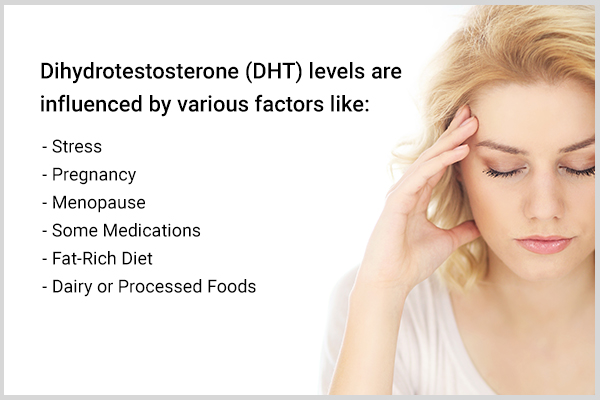
DHT levels are influenced by various factors including:
- Stress
- Pregnancy
- Menopause
- Some medications
- A fat-rich diet
- Dairy or processed foods
Can stress increase hair loss?
Any kind of stress can cause as much as 70% of scalp hair to shed for about 2 months after the stressful event. This increase in hair loss is known as acute telogen effluvium. (20)
Final Word
Hair loss can be an awful problem that can affect your mood and well-being. Fortunately, there are many ways to prevent hair loss that occurs from an oily scalp. Follow the tips given above to help control scalp oiliness.
- Was this article helpful?
- YES, THANKS!NOT REALLY


